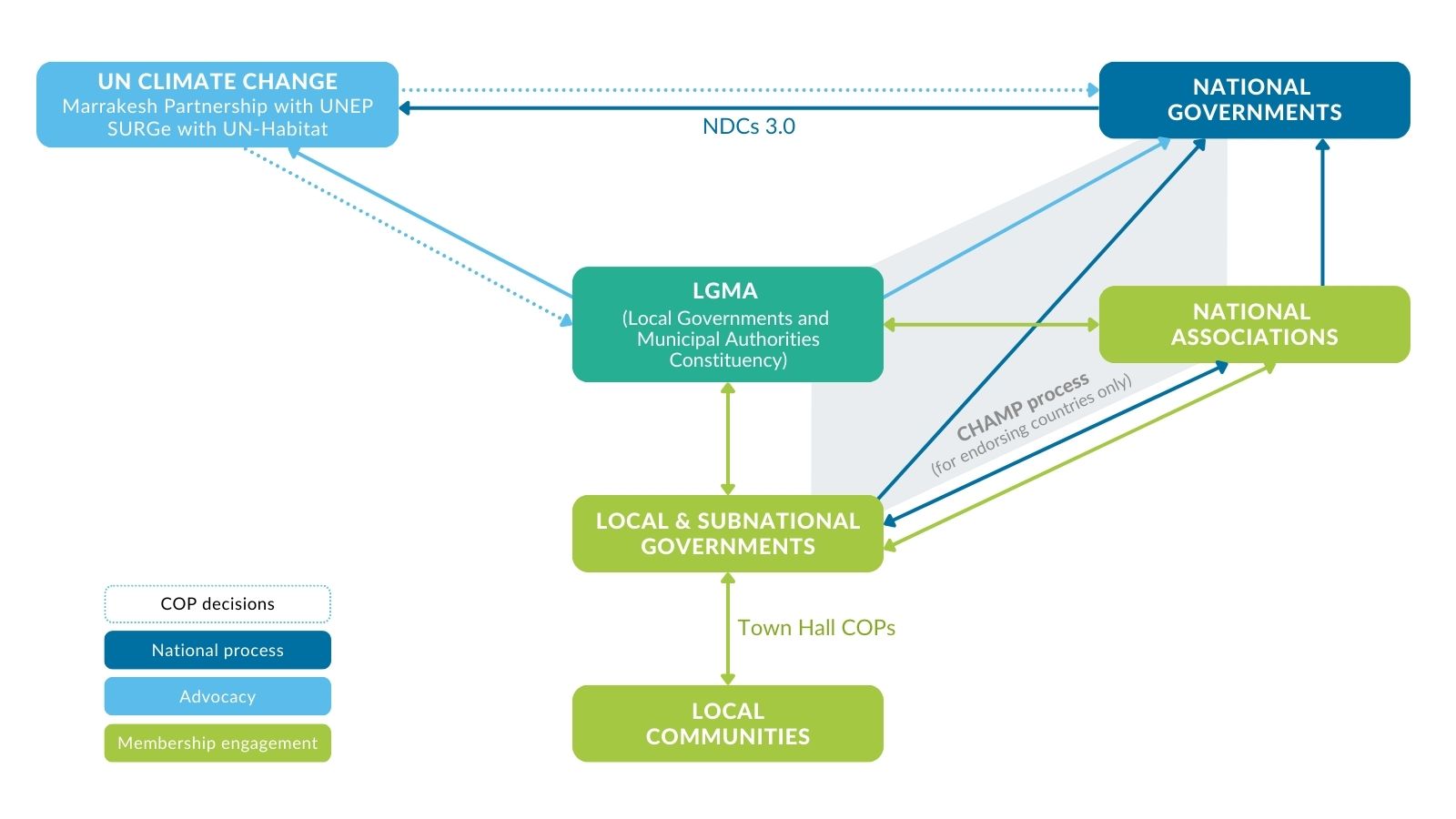Town Hall COPs
What are Town Hall COPs?
The Town Hall COP Initiative is a global movement empowering local and regional governments to connect their communities to national and international climate processes. Inspired by the format of UN Climate Change Conferences (COPs), these locally organized events offer a platform for inclusive dialogue that brings together residents, local leaders, civil society, and national government representatives.
Each Town Hall COP is community-led, nationally relevant, and transformation-oriented—designed to translate global climate goals into meaningful local action. Whether branded as a climate summit, a community conversation, or something entirely unique, these events are adaptable to local contexts and supported by resources and guidance. The insights and outcomes of each Town Hall COP feed directly into national climate plans (NDCs) and the global climate agenda, offering an unprecedented opportunity for communities to help shape climate policy from the ground up.
From local stocktakes to Town Hall COPs
Town Hall COPs were piloted in 2023 under the brand of Stocktake4ClimateEmergency, or “Local Stocktake,” linking the initiative to the Global Stocktake under the Paris Agreement, a critical mechanism for assessing global progress on climate goals to which these local stocktakes contributed directly.
The Town Hall COPs have since become a way for local governments to assess their climate progress, share insights, and collaborate with national governments. This process fosters multilevel governance — meaning that local, regional, and national governments work together, sharing responsibilities for implementing climate action. Importantly, Town Hall COPs help integrate local voices into global climate policies, particularly countries’ Paris Agreement plans, known as Nationally Determined Contributions (NDCs).
How Town Hall COPs fit into the current global climate arena
Just as the annual UN climate conference serves as a negotiation space for nations, local-level Town Hall COPs give communities the chance to assess climate action and negotiate their own path forward. The LGMA — as focal point to the UNFCCC for cities and regions — serves as a bridge between Town Hall COPs, national governments and associations, and the UN.
(Click on the image to view it full screen)
Town Hall COPs empower local actors to contribute to global climate negotiations and accelerate climate action by bridging local efforts with national and international frameworks (see Figure). This collaboration is vital for enhancing the ambition of future NDCs, which will be updated before COP30 in 2025.
The initiative is also aligned with the CHAMP (Coalition for High Ambition Multilevel Partnerships) framework, launched at COP28, which seeks to strengthen collaboration across all levels of government. By engaging local authorities and incorporating their feedback into national climate strategies, this entire process strives to ensure that climate targets are not only ambitious but also realistically implementable.
Every Town Hall COP shares three fundamental principles
Town Hall COPs are community-led
The Town Hall COP model is built around the needs and priorities of each community and can be adapted to fit local goals. Hosts could choose to focus on, for example, helping residents understand national climate plans by turning complex policies into practical, local conversations or highlighting local climate leadership by showcasing projects, gathering input, and building new partnerships.
Town Hall COPs are nationally relevant
New national climate plans—called Nationally Determined Contributions (NDCs) 3.0—are due at COP30 in 2025. The insights and outcomes from Town Hall COPs can directly inform national plans, support relevant efforts such as COP28 Coalition for High Ambition Multilevel Partnership for Climate Action Initiative (CHAMP), and feed into global climate discussions. Each Town Hall COP should aim to connect with national climate efforts by inviting government representatives, sharing outcomes, and staying in touch before and after the event. ICLEI will help share these results through its role as the official voice of local governments in the UN climate process.
Town Hall COPs are transformation-oriented
Town Hall COPs should highlight the real-world and daily-life connections between climate action and essential community priorities, like health, nature, justice, consumption affordability, jobs, and culture at the local level. ICLEI’s Town Hall COP toolkit provides guidance to ensure a transformation-oriented approach at these events that speaks to the daily realities of community members.
The vision: Annual Town Hall COPs in hundreds of cities
Imagine hundreds or even thousands of communities each year around the world actively engage in the UNFCCC processes — without ever leaving their home towns. Town Hall COPs empower youth, Indigenous Peoples, the business community, academia, and the most climate-vulnerable to join alongside their local and regional governments to accelerate climate action. As the link between local, regional, and national governments, as well as the UNFCCC, the LGMA can serve to facilitate interactions between local climate plans and NDCs.
We face a particularly strategic opportunity in the leadup to COP30 in Belem, when Paris Agreement signatory countries will deliver their next round of NDCs. Town Hall COPs held between Urban October 2024 and COP30 in 2025 can meaningfully inform this NDC cycle and set a course for annual mini-COPs for years to come.





